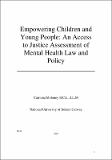| dc.contributor.advisor | Keys, Mary | |
| dc.contributor.author | Moloney, Catriona | |
| dc.date.accessioned | 2016-10-10T08:42:25Z | |
| dc.date.issued | 2016-10-08 | |
| dc.identifier.uri | http://hdl.handle.net/10379/6051 | |
| dc.description.abstract | This thesis aims to comparatively assess the Irish government’s national, international
and regional obligations to respect, protect and fulfil children’s access to justice rights
under mental health law, policy and practice. It considers the importance of rights for
children and why children should be viewed as rights-holders. It explores the
Capability Approach, the sociology of childhood and a rights-based approach to
children’s issues. This thesis considers the implications of the European Convention
on Human Rights, the Convention on the Rights of the Child and the Convention on
the Rights of Persons with Disabilities for the development of mental health laws
from a child rights perspective. This research compiles and analyses the relevant
human rights instruments and interpretive sources required for the selection of human
rights standards and indicators for the development in this thesis of a Child Rights
Access to Justice Impact Assessment (CRAJIA) tool. The CRAJIA tool is
underpinned by respected methodological approaches and therefore the information
gathered from its application in this thesis will provide research-based evidence as to
whether children’s access to justice rights are being realised. A number of
recommendations are made to improve the visibility of children and the impact of
their rights when they are admitted for inpatient mental health care and treatment.
This thesis proposes clear and positive improvements for the incorporation of a childfriendly
justice framework in Irish mental health law and policy. It also outlines a
five step process for children’s effective participation in decision-making and ten
principles that should be considered in a best interests assessment. Incorporating the
framework proposed in this thesis will ensure rights translate into practice, thus
ensuring children are empowered and visible in decision-making processes affecting
them. | en_IE |
| dc.rights | Attribution-NonCommercial-NoDerivs 3.0 Ireland | |
| dc.rights.uri | https://creativecommons.org/licenses/by-nc-nd/3.0/ie/ | |
| dc.subject | European convention on human rights | en_IE |
| dc.subject | Law | en_IE |
| dc.subject | Mental health law | en_IE |
| dc.subject | Access | en_IE |
| dc.subject | Justice | en_IE |
| dc.subject | Children | en_IE |
| dc.subject | Childhood | en_IE |
| dc.subject | Disability | en_IE |
| dc.subject | Deprivation | en_IE |
| dc.subject | Liberty | en_IE |
| dc.subject | Participation | en_IE |
| dc.subject | Admission orders | en_IE |
| dc.subject | Mental Health Act 2001 Section 25 | en_IE |
| dc.subject | Convention on the rights of the child | en_IE |
| dc.subject | Convention on the rights of persons with disabilities | en_IE |
| dc.subject | European convention on human rights | en_IE |
| dc.subject | Children's rights | en_IE |
| dc.subject | Mental disorder | en_IE |
| dc.subject | Mental capacity | en_IE |
| dc.subject | Legal capacity | en_IE |
| dc.subject | Child-friendly justice | en_IE |
| dc.subject | Child rights impact assessment | en_IE |
| dc.title | Empowering children and young people: an access to justice assessment of mental health law and policy | en_IE |
| dc.type | Thesis | en_IE |
| dc.contributor.funder | School of Law, NUI Galway | en_IE |
| dc.local.note | This thesis develops a Child’s Rights Access to Justice Impact Assessment tool to measure Ireland’s obligations to respect, protect and fulfil children’s rights under mental health law and policy. The results are used to recommend a child-friendly justice framework to build children’s opportunities to exercise their rights, and the State’s capacity to fulfil its obligations. | en_IE |
| dc.description.embargo | 2020-03-29 | |
| dc.local.final | Yes | en_IE |
| nui.item.downloads | 287 | |


